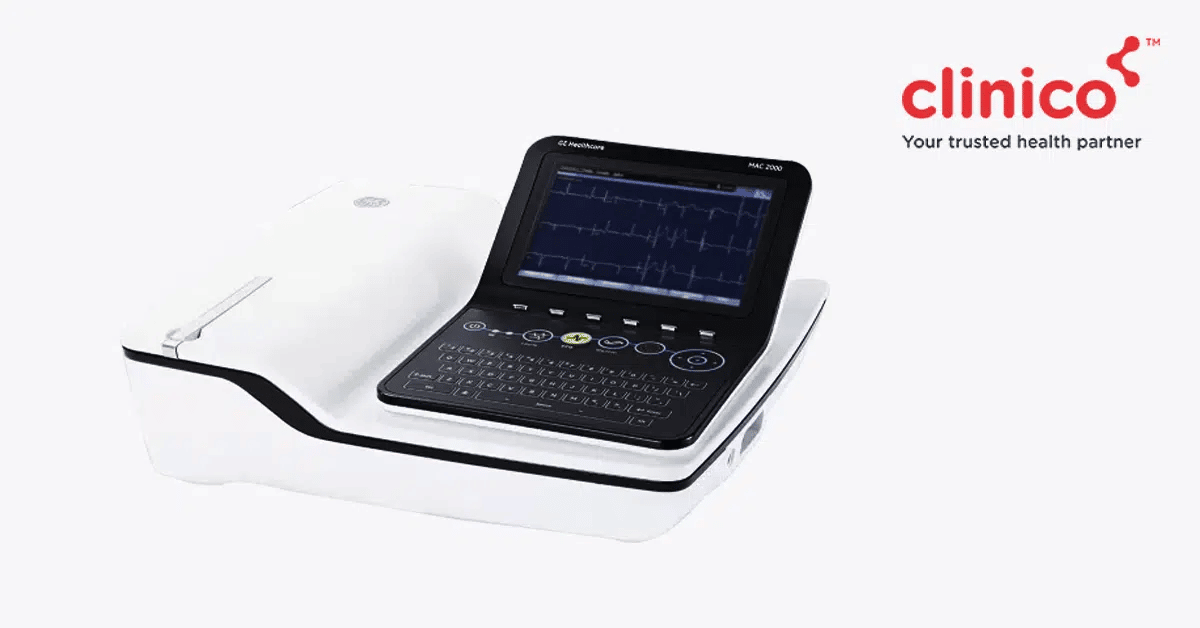
What is ECG?
ECG stands for Electrocardiogram. It’s a simple test that helps check the heart rhythm & electrical activity and detect signs of heart disease.
Small electrode patches are attached to the skin of the chest, arms and legs which help record the electrical activity of the heart. Heart signals are recorded by a machine, which are then examined by a doctor to check if they’re normal or abnormal.
When is ECG Used?
ECG is used in the investigation & identification of a potential heart problem in a person who is experiencing symptoms like chest pain, shortness of breath, palpitations, dizziness, etc. It’s generally recommended by a doctor who thinks there might be an issue related to the heart.
The ECG test may help detect:
- Arrhythmias – heart beating very slowly, too fast, or in an irregular manner
- Coronary heart disease – heart’s blood supply is obstructed or blocked by a build-up of fatty substances
- Heart attacks – supply of blood to the heart gets abruptly blocked
- Cardiomyopathy – heart walls become thickened or enlarged
The ECG test is usually conducted in addition to other tests to help in the accurate diagnosis & monitoring of heart conditions.
What are the types of ECG?
Three main types of ECG currently exist. This include:
- Resting ECG – test conducted while you’re lying down in a relaxed position.
- Stress or Exercise ECG – test conducted while you’re using a treadmill or exercise bike, the electrical activity of your heart is measured while you are physically active.
- Ambulatory ECG (Holter monitor) – the electrical activity of your heart is recorded generally over a period of 24 hours.
The type of ECG a doctor recommends will depend on the symptoms & suspected heart problem.
What does the ECG test show?
The ECG test results show your heart rate and rhythm, which is examined by a doctor to detect anything unusual.
Normal ECG test results generally comprise:-
- Heart rate: 60-100 beats per minute
- Heart rhythm: consistent & even/li>
Abnormal ECG test results may indicate:-
- Damage or changes to the heart muscle
- Past or current heart attack
- Poor blood supply to the heart arteries
- Heart enlargement
- Congenital heart defect
- Fluid or swelling in the sac around the heart
- Myocarditis (inflammation of the heart)
- Arrhythmias (abnormal heart rhythms)
- Changes in the amount of electrolytes like potassium & calcium in the blood
Conclusion
To conclude, ECG is a simple, risk-free & painless test that plays a crucial role in the diagnosis and monitoring of heart-related problems globally.
Are you looking to get an ECG done for you or your family member?
Clinico is here to help!
One of Mumbai’s highly rated diagnostic chains and an established NABL certified brand, we offer best-in-class diagnostic & pathology services in Mulund, Bhandup, Thane & Airoli.
Schedule Your ECG Today! Contact us 24×7 on 9504555555.
FAQ’s
Even though an ECG is quite accurate at diagnosing various kinds of cardiovascular disease, it may not always be able to detect every heart issue. You could still have a heart condition after having a normal ECG test report.
No, ECG cannot detect high cholesterol. However, doctors may prescribe ECG to individuals with a higher risk of cardiovascular disease due to high cholesterol.
Defects related to heart valves cannot be detected in an ECG.
Hazen, Mark S., Thomas H. Marwick, and Donald A. Underwood. “Diagnostic accuracy of the resting electrocardiogram in detection and estimation of left atrial enlargement: an echocardiographic correlation in 551 patients.” American heart journal 122.3 (1991): 823-828.
https://www.sciencedirect.com/science/article/pii/000287039190531L
DiMarco, John P., and John T. Philbrick. “Use of ambulatory electrocardiographic (Holter) monitoring.” Annals of internal medicine 113.1 (1990): 53-68.
https://www.acpjournals.org/doi/abs/10.7326/0003-4819-113-1-53
Shah, Manish, Fadi G. Akar, and Gordon F. Tomaselli. “Molecular basis of arrhythmias.” Circulation 112.16 (2005): 2517-2529.
https://www.ahajournals.org/doi/abs/10.1161/circulationaha.104.494476
Barker, David JP. “Fetal origins of coronary heart disease.” Bmj 311.6998 (1995): 171-174.
https://www.bmj.com/content/311/6998/171.short
Wexler, Randy, et al. “Cardiomyopathy: an overview.” American family physician 79.9 (2009): 778.
https://www.ncbi.nlm.nih.gov/pmc/articles/PMC2999879/

